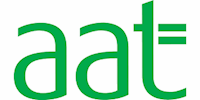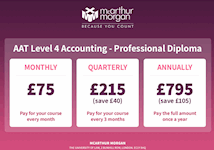AAT Level 4 Professional Diploma in Accounting - Subscription starts from £75
Online based course with 7 days a week tutor support until 10pm *Hard Copy materials available on request*
McarthurMorgan
Summary
£75 per month
£215 per quarter (save £40) - Pay for your course every 3 months,...
- Exam(s) / assessment(s) not included in price, and must be purchased separately
- Tutor is available to students
- TOTUM card available but not included in price What's this?
Add to basket or enquire
Overview
Obtain an outstanding professional accountancy qualification to gain employment or promotion within the finance and accounting industry.
Why study AAT Online Distance Learning - 'On Demand' with McArthur Morgan?
Maximum Flexibility - Study at your own pace, anytime, anywhere on any device
We are a dedicated AAT Training provider - this makes us specialists at delivering the AAT qualification.
We will send the Full range of study materials delivered to your home or office - delivery costs are included.
Pre-recorded video tutorials, available for every module - delivered by our team of highly experienced, fully qualified accountancy tutors.
Full tutor support available up to 10pm, 7 days a week.
We regularly achieve 100% pass rates
The Professional Diploma in Accounting can lead to employment as:
- Accounts Payable and Expenses Supervisor
• Assistant Financial Accountant
• Commercial Analyst
• Cost Accountant
• Fixed Asset Accountant
• Indirect Tax Manager
• Payments and Billing Manager
• Payroll Manager
• Senior Bookkeeper
• Senior Finance Officer
• Senior Fund Accountant
• Senior Insolvency Administrator
• Tax Supervisor
• VAT Accountant
Qualification
AAT Professional Diploma in Accounting - Level 4
Course media
Description
The units of this level are:
- Management Accounting: Budgeting
- Management Accounting: Decision and Control
- Financials Statements of Limited Companies.
- Professional Diploma Synoptic Assessment
- Business Tax (optional)
- Personal Tax (optional)
- Credit Management (optional)
Modules
Management Accounting: Budgeting
- This unit is about the use of budgeting for planning, coordinating and authorising the activities of an organisation and for controlling costs.
- The unit provides skills and knowledge to improve the performance of an organisation by setting targets, constructing achievable plans and monitoring results.
- Students will develop a range of skills within the context of planning and control.
Learning outcomes
- Prepare forecasts of income and expenditure
- Prepare budgets
- Demonstrate how budgeting can improve organisational performance
- Report budgetary information to management in a clear and appropriate format
Management Accounting: Decision and Control
- This unit is one of the mandatory Professional level units. It takes students from Advanced level costing principles and prepares them to be valuable members of a management accounting finance team.
- A student who has successfully completed this unit, together with the Professional level unit, Management Accounting: Budgeting, should be a useful member of a management accounting team.
- This unit teaches students management accounting principles and concepts.
Learning outcomes
- Analyse a range of costing techniques to support the management accounting function of an organisation.
- Calculate and use standard costing to improve performance.
- Demonstrate a range of statistical techniques to analyse business information.
- Use appropriate financial and non-financial performance techniques to aid decision making.
- Evaluate a range of cost management techniques to enhance value and aid decision making.
Financials Statements of Limited Companies.
- This unit is concerned with the drafting, analysis and interpretation of financial statements of limited companies.
- On successful completion of this unit, a student could be expected to be able to draft the financial statements of single limited companies and groups of companies with little supervision.
- The unit provides students with the skills and knowledge for drafting the financial statements of single limited companies and consolidated financial statements for groups of companies.
Learning Outcomes
- Demonstrate an understanding of the reporting frameworks and ethical principles that underpin financial reporting.
- Demonstrate an understanding of the key features of a published set of financial statements.
- Draft statutory financial statements for a limited company.
- Draft consolidated financial statements.
- Interpret financial statements using ratio analysis
Professional Diploma Synoptic Assessment
- This unit aims to enable students to demonstrate their understanding of the role of the accounting function in an organisation and the importance of internal controls in minimising the risk of loss.
- Students will then make recommendations to address the weaknesses, having regard for the costs and benefits, the sustainability and the impact of those recommendations on users of the accounting system.
Learning outcomes
- Demonstrate an understanding of the role and responsibilities of the accounting function within an organisation.
- Evaluate internal control systems.
- Evaluate an organisation’s accounting system and underpinning procedures.
- Analyse recommendations made to improve an organisation’s accounting system.
Business Tax (optional)
- This unit introduces the student to UK taxation relevant to businesses.
- In learning how to prepare tax computations, students will gain skills in the tax treatment of capital expenditure, and the adjustment of accounting profits for tax purposes for sole traders, partnerships and limited companies.
- The student will become familiar with the completion of tax returns.
Learning outcomes
- Complete tax returns for sole traders and partnerships and prepare supporting tax
computations. - Complete tax returns for limited companies and prepare supporting tax computations.
- Provide advice on the UK’s tax regime and its impact on sole traders, partnerships and limited companies.
- Advise business clients on tax reliefs, and their responsibilities and their agent’s responsibilities in reporting taxation to HMRC.
- Prepare tax computations for the sale of capital assets.
Personal Tax (optional)
- This unit is about the key aspects of taxation that affect UK taxpayers.
- It covers income tax, National Insurance (NI), capital gains tax and inheritance tax.
- This unit provides students with the underpinning theory on taxation, such as what makes for a fair and equitable taxation system.
Learning outcomes
- Analyse the theories, principles and rules that underpin taxation systems
- Calculate a UK taxpayer’s total income.
- Calculate income tax and National Insurance (NI) contributions payable by a UK taxpayer.
- Account for capital gains tax.
- Discuss the basics of inheritance tax.
Credit Management (optional)
- This unit is about understanding and applying the principles of effective credit control in an organisation.
- Students will require an understanding of the principles of credit control in the
context of relevant legislation, contract law, best practice, professional ethics and organisational policies. - Students will gain knowledge of sources of information and techniques used to assess credit risks in compliance with organisational policies, data protection legislation and professional ethics.
Learning outcomes
- Analyse relevant legislation and contract law that has an impact on the credit control environment.
- Critically analyse information from a variety of sources to assess credit risk and grant credit in compliance with organisational policies and procedures.
- Evaluate a range of techniques to collect debts.
- Critically evaluate credit control in line with organisational policies and procedures.
- Present advice and recommendations to management on the credit control system.
Who is this course for?
The advanced level will suit you if:
- you have completed the intermediate accounting level and would like to
build your skills. - you are already working in finance and you’d like a formal recognition
of your skills. - you would like to go on to be an AAT full member or study for
chartered status.
Requirements
Students who have completed the Intermediate Level (Level 3)
Career path
The Professional Diploma in Accounting can lead to employment as:
- Accounts Payable and Expenses Supervisor
- Assistant Financial Accountant
- Commercial Analyst
- Cost Accountant
- Fixed Asset Accountant
- Indirect Tax Manager
- Payments and Billing Manager
- Payroll Manager
- Senior Bookkeeper
- Senior Finance Officer
- Senior Fund Accountant
- Senior Insolvency Administrator
- Tax Supervisor
- VAT Accountant
Questions and answers
Reviews
Currently there are no reviews for this course. Be the first to leave a review.
Legal information
This course is advertised on reed.co.uk by the Course Provider, whose terms and conditions apply. Purchases are made directly from the Course Provider, and as such, content and materials are supplied by the Course Provider directly. Reed is acting as agent and not reseller in relation to this course. Reed's only responsibility is to facilitate your payment for the course. It is your responsibility to review and agree to the Course Provider's terms and conditions and satisfy yourself as to the suitability of the course you intend to purchase. Reed will not have any responsibility for the content of the course and/or associated materials.



